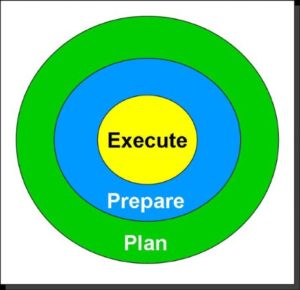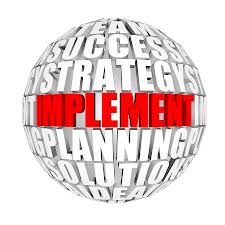 Implementation is the execution of a plan, idea, or strategy.
Implementation is the execution of a plan, idea, or strategy.
Note: As a disaster restoration coach and consultant, one of my most important jobs is to help contractors implement the programs and policies they want for their company.
Successful implementation of any plan includes identifying and assessing resources, establishing strategies, and developing a system to make it happen. Also, one of the most important aspects of success is having and following timetables for the completion of each level of the Plan.
How will you use an implementation plan?
- As a management tool
- To illustrate critical steps in starting and working on a project
- As a guide or map of where you are going and how to get there
- Assists you in being proactive rather than reactive
- Facilitates identifying any challenges or issues early in the process
- Assures a more positive outcome and success of the plan
 It should be a reflection of the specific goals and objectives of your company, and must establish benchmarks (e.g., the number of clients to visit daily/weekly). Plus, it’s the best way to measure the success (or failure) of the target benchmarks, (and the ultimate goal).
It should be a reflection of the specific goals and objectives of your company, and must establish benchmarks (e.g., the number of clients to visit daily/weekly). Plus, it’s the best way to measure the success (or failure) of the target benchmarks, (and the ultimate goal).
An implementation plan should have the following components:
- Task – list of project tasks or targets (prospects)
- Status – task status such as: completed, on schedule, behind schedule, canceled
- Day of initial visit and date of the next scheduled visit (i.e.: 2 weeks)
- Actual Completion Date – date task was completed
- Task Assignment – Name of the task owner
- What is the VBR (valid business reason for the visit or call)
- Notes – details to help remember important info
- There may be many many components listed here!
 Even the most well-thought-out implementation plan is just a bunch of notes if you don’t clarify objectives, assign tasks with deadlines, and chart your progress in reaching goals and milestones. Too many times we know where we need to go, but we fail to lay out the road map, and often end up making wrong turns, back-tracking, and even forgetting the original destination! The basic ingredients of an implementation plan should include:
Even the most well-thought-out implementation plan is just a bunch of notes if you don’t clarify objectives, assign tasks with deadlines, and chart your progress in reaching goals and milestones. Too many times we know where we need to go, but we fail to lay out the road map, and often end up making wrong turns, back-tracking, and even forgetting the original destination! The basic ingredients of an implementation plan should include:
Goal: Your objectives should be completely clear and specifically spelled out since the rest of the plan depends on an accurate and clear destination. For example, if you were going to take a vacation to Florida, these are some critical points you would need to know:
- when you were going
- when you were coming back
- how you would get there
- where you would stay
- what you hoped to do while there
- how you would pay for the trip
- and many other factors
Tasks: This should detail what has to be accomplished to attain your objectives, (the Florida vacation). Someone (even an outside advisor) should be involved in overseeing each step, so roles and responsibilities are well defined and there’s complete and measurable accountability. Assignments should be clearly expressed; micromanaging each step will only cause frustration, and confusion and likely slow the implementation down. Highlight the expected results associated with these tasks. Back to the vacation example, the steps could include the following:
- verifying the dates to travel worked with everyone’s schedule
- get airline tickets purchased
- book the hotel where you will stay
- know how you will get to the airport
- know how you will get from the airport to your hotel
- know how you will get around the city
- decide what the eating and food arrangements will be
- pack all the appropriate clothes
- arrange any required tour reservations
The above list is clearly specific to this particular vacation but serves as a great example of appropriate planning. The greater the detail, the more likely you will achieve the goal within the stated timeframe.
 Time allocation: To be fully measurable and provide a way to verify accountability, each task should be paired with an appropriate time frame for completion. If you are casual about the timeframe for completion, then those assigned to the task will also be casual. I recommend you be aggressive but sensible with your time allocation in order to guarantee not just accomplishment of the task, but competent work.
Time allocation: To be fully measurable and provide a way to verify accountability, each task should be paired with an appropriate time frame for completion. If you are casual about the timeframe for completion, then those assigned to the task will also be casual. I recommend you be aggressive but sensible with your time allocation in order to guarantee not just accomplishment of the task, but competent work.
Progress: You, a member of your management team (or an outside advisor) must be in charge of monitoring each task’s progress and the completion percentage of each objective. When delays occur, try to get to the cause of the setback. Did someone drop the ball? Did he or she have too many responsibilities to handle? Did a third party, such as a travel agent fail to hold up its end of a deal? Make adjustments to your task to appropriately account for the delay, make a note of the reason the original deadline was missed, and establish a new target date.
Many people reading this will immediately think; “this is overkill.” However, it has been shown time and time again “what gets measured – gets done!” The decision to begin a specific major plan will usually not include the benefit of familiarity and intimate knowledge of what exactly to expect. This is all the more reason to start implementing your plan with as much detail and measurement as possible. It’s more likely you will actually achieve the stated Plan and enjoy the successes that will happen.
Dick Wagner is a Disaster Restoration and Commercial Marketing Consultant. 419-202-6745
